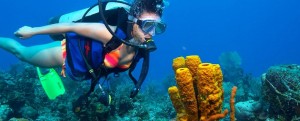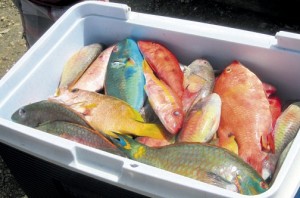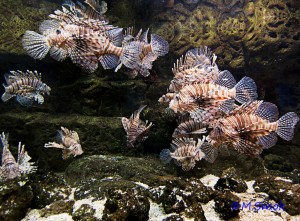
The Lion and the Parrot
April 20th, 2016
Is this a story about the depredations of humans on our wildlife – hunting the lions, trafficking our endangered parrots? Well, it could be, and certainly humans have been the instigators of a worrying dual problem. This is about the Caribbean, however, and it relates to fish.
Let’s start with the Parrot Fish, that beautiful denizen of coral reefs. It looks as if someone took a paintbrush and colored it in vibrant blues, pinks, yellows. There are actually around 80 different species of Parrot Fish, which can be found in tropical and sub-tropical oceans around the world. Apart from its gorgeous colors (and its unusual transgender-like family arrangements), the Parrot Fish is notable for its formidable set of teeth – fused together into something resembling a beak (hence the name). The Parrot Fish uses its beak to scrape off algae and other green stuff from surface of the coral. As it feeds, the fish grinds up pieces of coral in its teeth to get at the algae – and poops it out the other end.
Now, this activity is important for two reasons: Firstly, the fish keeps the coral reef healthy and free of the algae that can cause its demise. Secondly, the pooped-out coral – improperly digested and “processed,” if you will – forms the basis of our treasured white sand beaches.
The problem is: the numbers of Parrot Fish are dwindling across the Caribbean. There are a number of factors – primarily over-fishing, which is affecting many other fish species, of course. Another problem is that, simply put, Jamaicans love to eat Parrot Fish. It’s a cultural favorite.
The decline in Parrot Fish is already impacting Caribbean coral reefs, almost all of which are already under serious pressure – from pollution and the higher water temperatures that are resulting in the bleaching phenomenon. In a recent study of our reefs led by the University of Queensland, researcher Dr Yves-Marie Bozec noted: “We conclude that unregulated fisheries will seriously reduce the resilience of coral reefs.” She suggested that properly implemented regulations on fish size and the size of catches would help to balance things a little and still maintain fishers’ livelihoods. Professor Peter Mumby added: “We already know that failure to maintain coral habitats will lead to at least a threefold reduction in future fish catches.”
Well, how could it be otherwise? Protecting our Parrot Fish makes sense.
The Parrot Fish is a herbivore – it eats plant matter. The Lionfish, however, is an entirely different kettle of … fish (if you will pardon the pun). It is a carnivore, and a greedy one at that. It is rather spectacular looking, with its trailing fins and variegated color – and therefore popular as an aquarium fish. A native of the Indo-Pacific region, its introduction to Caribbean waters may have begun when some Lionfish escaped after an aquarium in Florida was destroyed during Hurricane Andrew in 1992. We are not exactly sure how it happened. What we do know, however, is that the Lionfish is an aggressive invasive species that has already done great harm in our waters – including harm to our Parrot Fish population and thus to the coral reefs. Unlike most coral reef species, it is venomous and has few natural predators; it is not clear whether they are part of a shark’s regular diet, for example.
Lionfish were recognized as a recipe for disaster for the Caribbean, from the outset. They have been reproducing rapidly, and they simply gobble up the native reef fish that come their way. Including, of course, Parrot Fish.

Snorkeling in the Belize Barrier Reef. Belize has instituted a ban on Parrot Fish to protect its much admired coral reefs that attract tourists.
So, how about a ban on the catching and eating of Parrot Fish? Some Caribbean nations have already instituted a ban – Belize, Bonaire and the Turks and Caicos Islands, for example, countries that depend on their coral reefs as an important part of their tourism product. Snorkelers and scuba divers don’t want to see dead reefs with no fish. However, when the topic was discussed on television recently, I was alarmed to hear the head of the Fisheries Division in the Ministry of Agriculture suggest that a ban on Parrot Fish was not desirable, because it would threaten fishermen’s livelihoods. I would suggest that, if the fisherfolk continue to take too much fish out of the sea, they will be out of a job anyway before too long – and we will be out of Parrot Fish. Many fishermen themselves are aware of this, when they look at their increasingly meager catches. They are starting to “join the dots”; it is a pity that a few of our government officials are not making those connections.
Tighter regulations (and if possible at least a temporary ban) on the catching of Parrot Fish are needed. More fish sanctuaries need to be set up at key vulnerable spots around Jamaica, properly regulated and monitored; the recent establishment of a fish sanctuary in Portland through the Alligator Head Foundation is extremely welcome. Areas rich in mangroves (such as the Portland Bight Protected Area, including Goat Islands) must be nurtured and protected; mangroves are an important nursery for young fish and other marine life. There must also be a comprehensive public education program on the value of Parrot Fish (and the threat of Lionfish) – starting in the schools and including fishers and other community members. May I suggest, also, that we stop using our seas as a garbage dump.
And we all need to acquire a liking for Lionfish. It is gradually appearing on more restaurant menus. Curried, escoveitched, steamed…I hear it is quite tasty!
As for me – much as I used to love them, I will never eat another Parrot Fish again.
Tags: Alligator Head Foundation, Belize, Bonaire, Caribbean, Climate Change, coral reefs, fish sanctuaries, Fisheries Division, Florida, Indo-Pacific, Jamaica, Lionfish, Ministry of Agriculture, overfishing, Parrot Fish, Portland Bight Protected Area, Turks and Caicos Islands, University of Queensland
The Gleaner reserves the right not to publish comments that may be deemed libelous, derogatory or indecent.
To respond to The Gleaner please use the feedback form.
- We Are the Zoomers
- Living Online with Humans and Birds: NAOC 2020
- Human Trafficking and the Problem of Public Education
- Down Memory Lane
- Are We Ready to Recover from COVID-19?
- Road Safety Matters: Is Your Vehicle Safe?
- Sexual Harassment, Me Too, and the Minister’s Disturbing Giggle
- The Vulnerable Senior Citizens, Private Care Homes and COVID-19
- A Muddle Over Masks
- Here is Something Life-Saving You Can Do: Give Blood!




